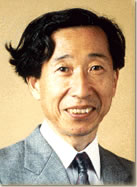

and Information Geometry
Abstract
Divergence measures between two probability distributions or more generally two signals play a fundamental role in designing algorithms of signal processing and adaptation. We first elucidate geometrical and invariant structures of divergence measures such as Kullback-Leibler and Bregman divergences. They are useful for designing algorithms in vision analysis, signal processing and optimization. Algorithms and frameworks of signal separation will be surveyed from the geometrical point of view.
Prof. Shun-ichi AMARI, after completing his professorship at The University of Tokyo, moved to The Institute of Physical and Chemical Research - RIKEN where he holds the position of vice-president of Brain Science Institute, director of Brain Style Information Systems Group and team leader of Mathematical Neuroscience Laboratory. He also serves on boards of numerous scientific journals and committees.
Academic qualifications:
1958 B.Eng. University of Tokyo, majoring in Mathematical Engineering
1963 Ph.D. University of Tokyo, Mathematical Engineering
Professional qualifications:
Fellow of IEEE
Professor Emeritus at the University of Tokyo
Social Activities:
| 1996 | President of the International Neural Network Society |
1995-1999 |
Council Member of the Bernoulli Society of Mathematical Statistics and Probability Theorem |
2004-2005 |
President of the Institute of Electronics, Information and Communication Engineers, Japan |
| etc. |
Awards
| 1964 | Inada Award from the Institute of Electronics, Information and Communication Engineers (IEICE), Japan |
1965, 1987 |
Best Paper Awards from IEICE Japan |
| 1987 | Yonezawa Special Award, IEICE Japan |
| 1987 | Kodansha Best Scientific Publication Award for "Biocomputer", Iwanami (1986) |
| 1990 | Academic Research Award, International Foundation for Artificial Intelligence |
| 1992 | IEEE Neural Networks Pioneer Award |
| 1993 | Neurocomputing Best Paper Award |
| 1993 | Best Paper Award (Japanese Neural Network Society) |
| 1993 | Best Research Achievement Award (Japanese Neural Network Society) |
| 1994 | INNS Neural Networks Leadership Award |
| 1995 | Japan Academy Award |
| 1997 | IEEE Emanuel R. Piore Award |